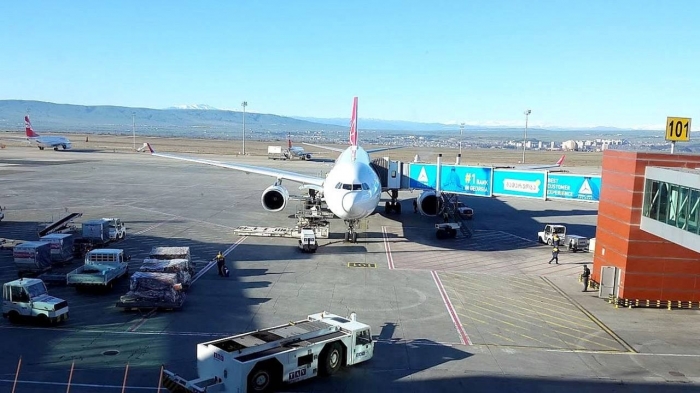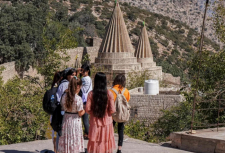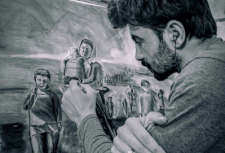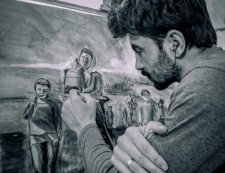Instructions for returning to Georgia from high-risk countries

The Ministry of health, along with the spread of the coronavirus, publishes recommendations to international travellers from countries with high-risk areas. These are considered: Italy, South Korea, Iran, China.
The center for disease control calls on citizens who return to the country from high-risk countries to be placed in a two-week quarantine and self-isolation.
If the passenger is coming from a country with a high risk of spreading a new coronavirus (COVID-19) (China, Iran, Italy, South Korea), the following rules should be followed:
While on a plane:
* filling out a special travel history questionnaire;
• on Board the aircraft, you must wear a mask, which should be changed every two hours to a new one, and the old one should be placed in a waste bag (disposed of);
* strictly follow the rules of personal hygiene: before eating, wash your hands with soap and water or use an alcohol-containing solution for hands;
* after using the toilet, wash your hands with soap and water and / or use an alcohol-based hand solution;
* avoid close contact with people who have a cough and fever (chills);
* avoid touching parts of the face with your hands.
At Tbilisi international airport / ground border checkpoints:
* pass through the thermal screen of the thermal scanner (invisible to passengers), or through a remote thermometer check;
* filling out an information card (with a detailed survey of passengers) by an epidemiologist of the revenue Service.
If a passenger is being screened: * there is a temperature above 37.5 and a cough, in addition, during the last 14 days, the passenger has visited countries with a high prevalence of the virus, he will be taken to an infectious disease hospital by ambulance, where research will be conducted to exclude a new coronavirus. To do this, take a smear from the nasopharynx and send it to Lugar's laboratory, from which the answer will be known no later than 12 hours later. Discharge from the hospital (hospital) occurs if there are no relevant clinical signs of the disease and/or if the results of laboratory tests are corrected.
• No temperature reaction was recorded, but the passenger has other signs of acute respiratory infection (runny nose, weakness, etc.). in addition, within 14 days before the onset of symptoms, he had contact with a confirmed or suspected case of COVID-19, or worked or was in a medical facility where the probable cases of COVID-19 were confirmed or treated, he will be taken to an infectious hospital by ambulance, where tests will be conducted to exclude him from the coronavirus. To do this, take a smear from the nasopharynx and send it to the Lugar laboratory, from which the response to the study will be known no later than 12 hours. Discharge from the hospital (hospital) occurs if there are no relevant clinical signs of the disease and/or if the results of laboratory tests are corrected.
* The temperature reaction was not recorded and there were no problems with the respiratory system, but during the last 14 days was in contact with an infected person, and the study conducted by epidemiologists revealed its "contact" status, in this case, the passenger is subject to two weeks of isolation: if the passenger's place of residence meets the requirements of self-isolation, after reading the relevant instructions, he is sent home, where periodic monitoring by an epidemiologist will be carried out.
In other cases, the passenger is transferred to the quarantine zone allocated by the Ministry of health, where periodic monitoring by an epidemiologist will be carried out. If a person placed in a self-isolation or quarantine zone works, the Ministry of internally displaced persons from the occupied territories, labour, health and social Affairs of Georgia is authorized, if requested, to issue such persons a certificate of legal effect equal to a sick leave.
apsny.ge
Tags:
Instructions for returning to Georgia from high-risk countries

The Ministry of health, along with the spread of the coronavirus, publishes recommendations to international travellers from countries with high-risk areas. These are considered: Italy, South Korea, Iran, China.
The center for disease control calls on citizens who return to the country from high-risk countries to be placed in a two-week quarantine and self-isolation.
If the passenger is coming from a country with a high risk of spreading a new coronavirus (COVID-19) (China, Iran, Italy, South Korea), the following rules should be followed:
While on a plane:
* filling out a special travel history questionnaire;
• on Board the aircraft, you must wear a mask, which should be changed every two hours to a new one, and the old one should be placed in a waste bag (disposed of);
* strictly follow the rules of personal hygiene: before eating, wash your hands with soap and water or use an alcohol-containing solution for hands;
* after using the toilet, wash your hands with soap and water and / or use an alcohol-based hand solution;
* avoid close contact with people who have a cough and fever (chills);
* avoid touching parts of the face with your hands.
At Tbilisi international airport / ground border checkpoints:
* pass through the thermal screen of the thermal scanner (invisible to passengers), or through a remote thermometer check;
* filling out an information card (with a detailed survey of passengers) by an epidemiologist of the revenue Service.
If a passenger is being screened: * there is a temperature above 37.5 and a cough, in addition, during the last 14 days, the passenger has visited countries with a high prevalence of the virus, he will be taken to an infectious disease hospital by ambulance, where research will be conducted to exclude a new coronavirus. To do this, take a smear from the nasopharynx and send it to Lugar's laboratory, from which the answer will be known no later than 12 hours later. Discharge from the hospital (hospital) occurs if there are no relevant clinical signs of the disease and/or if the results of laboratory tests are corrected.
• No temperature reaction was recorded, but the passenger has other signs of acute respiratory infection (runny nose, weakness, etc.). in addition, within 14 days before the onset of symptoms, he had contact with a confirmed or suspected case of COVID-19, or worked or was in a medical facility where the probable cases of COVID-19 were confirmed or treated, he will be taken to an infectious hospital by ambulance, where tests will be conducted to exclude him from the coronavirus. To do this, take a smear from the nasopharynx and send it to the Lugar laboratory, from which the response to the study will be known no later than 12 hours. Discharge from the hospital (hospital) occurs if there are no relevant clinical signs of the disease and/or if the results of laboratory tests are corrected.
* The temperature reaction was not recorded and there were no problems with the respiratory system, but during the last 14 days was in contact with an infected person, and the study conducted by epidemiologists revealed its "contact" status, in this case, the passenger is subject to two weeks of isolation: if the passenger's place of residence meets the requirements of self-isolation, after reading the relevant instructions, he is sent home, where periodic monitoring by an epidemiologist will be carried out.
In other cases, the passenger is transferred to the quarantine zone allocated by the Ministry of health, where periodic monitoring by an epidemiologist will be carried out. If a person placed in a self-isolation or quarantine zone works, the Ministry of internally displaced persons from the occupied territories, labour, health and social Affairs of Georgia is authorized, if requested, to issue such persons a certificate of legal effect equal to a sick leave.
apsny.ge
Tags:


























